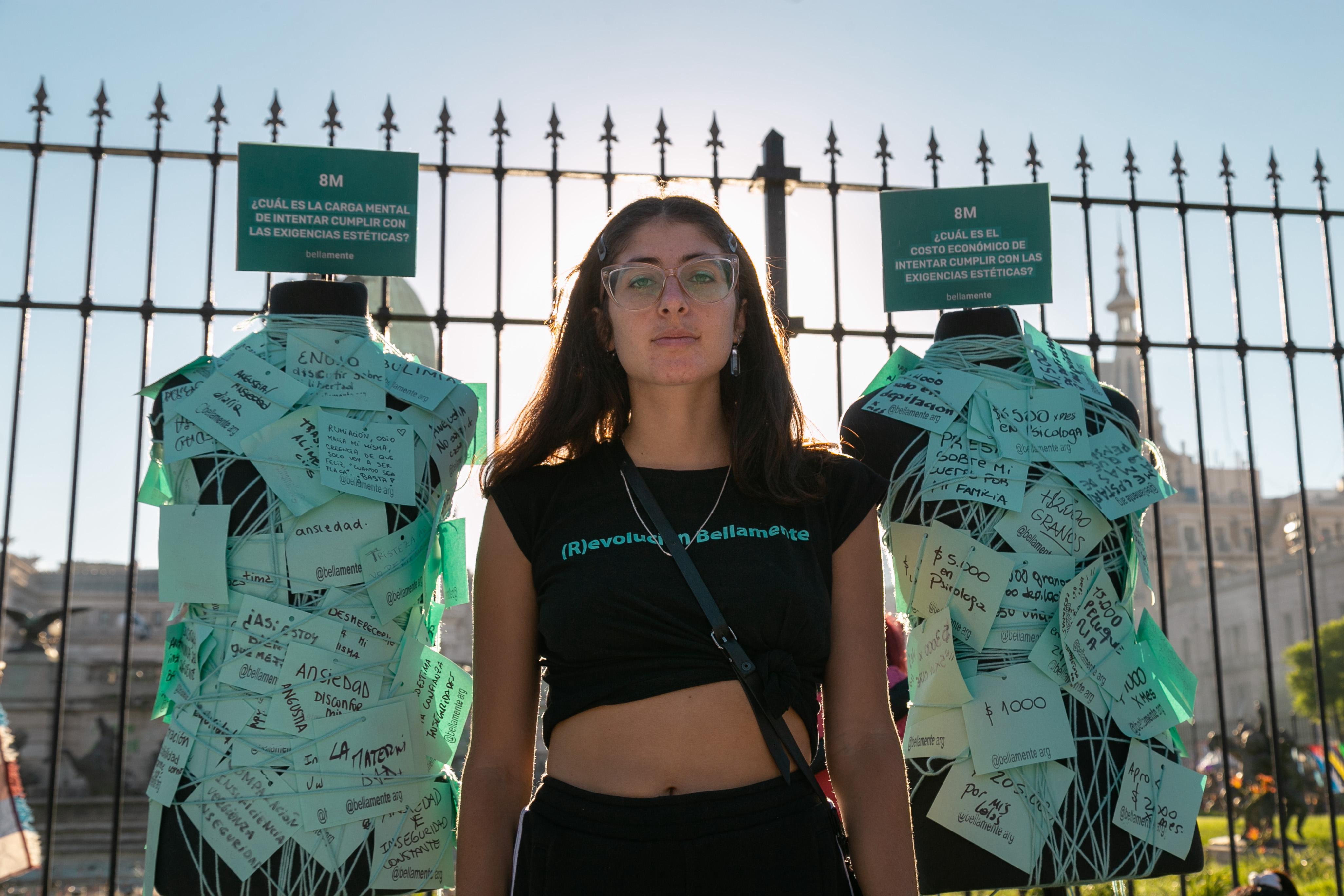Breaking the cycle: addressing eating disorders and mental health in Argentina
MPP student Candela Yatche is the founder of Bellamente, a non-profit organisation committed to preventing eating disorders. She argues that it’s time for the discourse around eating disorders to extend beyond social media to policymakers.

At 17 years old in Argentina, I became entangled in an exhausting cycle of dieting, excessive exercise and pressure to attain the ‘ideal body’. I witnessed discriminatory beauty standards in nightlife venues and the overwhelming presence of beauty-related advertisements on social media. It became clear that this was not just a personal struggle but a widespread issue affecting many, which left me feeling compelled to act.
In 2018 I founded Bellamente. What started as an Instagram account questioning societal beauty norms quickly evolved into a foundation advocating for body diversity and policy change.
Argentina is no exception to the global rise of eating disorders. According to the World Health Organisation, these conditions have some of the highest mortality rates among mental health disorders. Delayed diagnoses, stigma and limited access to specialised care worsen the crisis, while social media and unrealistic beauty standards fuel body dissatisfaction, contributing to an alarming rise in cases worldwide.
The reality in Argentina
My experience is sadly not unique. In Argentina, 8 out of 10 women experience body dissatisfaction, a key risk factor for developing eating disorders. Cultural and societal expectations around beauty, amplified by the media, only exacerbate this issue. This pressure is not just a personal struggle but a form of ‘aesthetic violence’, as described by feminist scholar Esther Pineda, systematically imposing beauty standards that harm individuals physically and psychologically. This issue falls within a broader framework of gender-based violence, where patriarchal structures dictate who is deemed valuable or acceptable based on appearance.
Argentina has one of the highest femicide rates in the region, with a woman killed every 30 hours due to gender-based violence. While often framed as physical violence, the oppressive system that dictates a woman’s worth extends to cultural expectations around appearance. The Ley 26.485, the Law of Integral Violence Against Women, recognises multiple forms of violence, including symbolic and psychological violence, aligning with the concept of aesthetic violence. However, enforcement remains a challenge.
Unrealistic beauty standards are reinforced through advertising, social media and discriminatory practices. Women who don’t conform often face workplace discrimination, lower wages, and pressure to invest in diet products and cosmetic procedures, reinforcing financial and social inequalities. By framing aesthetic violence within gender-based violence, it becomes clear that this is not just a personal struggle but a structural issue requiring systemic change.
Progress and challenges
A significant step towards addressing these issues has been the enactment of the Ley de Talles (Size Law) in Argentina, which mandates a study to ensure standardised and inclusive clothing sizes. Fundación Bellamente actively supported this legislation alongside AnyBody Argentina, by campaigning on social media - a crucial step towards the law’s effective implementation.
As digital landscapes evolve, artificial intelligence (AI) is reshaping beauty standards in ways that were previously unimaginable. AI-generated filters and hyper-edited images present a homogenised, unrealistic version of beauty, often erasing natural features and diversity. These idealised representations contribute to increased body dissatisfaction, particularly among young people who grow up seeing these altered images as the norm. Without proper regulation or transparency in how these technologies are used in media and advertising, the gap between real and artificial beauty will continue to widen, reinforcing unattainable expectations.
The internet has provided a platform for self-expression, but it has also become a space where aesthetic violence flourishes. Body shaming, cyberbullying and the spread of harmful beauty standards disproportionately target women and marginalised identities. Social media algorithms, designed to promote engagement, often amplify extreme beauty ideals, exposing users to an overwhelming stream of unrealistic content. At Fundación Bellamente, we have worked on initiatives to address digital violence, such as participating in Hackea la Violencia Digital, a regional programme organised by UN Women and the United Nations Population Fund (UNFPA) to tackle gender-based violence facilitated by technology. Addressing this issue requires a collective effort, stronger policies against digital harassment and greater responsibility from tech companies in curating the content.
Addressing these challenges requires coordinated efforts between governments, private companies and civil society. In 2021, Bellamente secured funding from Argentina’s Ministry of Health to conduct a nationwide mapping of specialised eating disorder treatment centres and to develop an early detection guide. These findings were made publicly available, and Meta (Instagram’s parent company) later integrated them into its platform, displaying them as support resources when users searched for eating disorder-related terms. This cross-sector collaboration shows how cross-sector partnerships can create meaningful change. Effective solutions require this type of coordination to ensure policies and resources reach those who need them most.
Despite its pervasive influence, the beauty industry remains largely unregulated, allowing misleading advertising and unsafe aesthetic procedures to thrive. The tragic case of Silvina Luna, who died due to complications from an unregulated cosmetic procedure, brought renewed attention to the dangers of medical malpractice in aesthetic treatments. However, these cases are not isolated–many individuals undergo risky procedures without reliable information or proper medical oversight. Just as Argentina’s food labelling law introduced clear health warnings to help consumers make informed choices, a similar regulatory approach could be applied to the beauty and aesthetic industry. Transparency in advertising, stricter safety regulations and accessible information on potential risks are essential to prevent further harm.
Looking ahead
Mental health and body image concerns are deeply woven into societal structures, cultural messages, and digital spaces. Fundación Bellamente is committed to breaking these cycles by fostering critical thinking and providing tangible solutions that empower future generations. As the Global Mental Health Summit has emphasised, ‘there is no health without mental health’. Addressing eating disorders and body dissatisfaction requires a comprehensive approach that incorporates regulation, education and cross-sector collaboration. The conversation must extend beyond social media into policy discussions, where individuals deserve to be seen, valued and protected.

